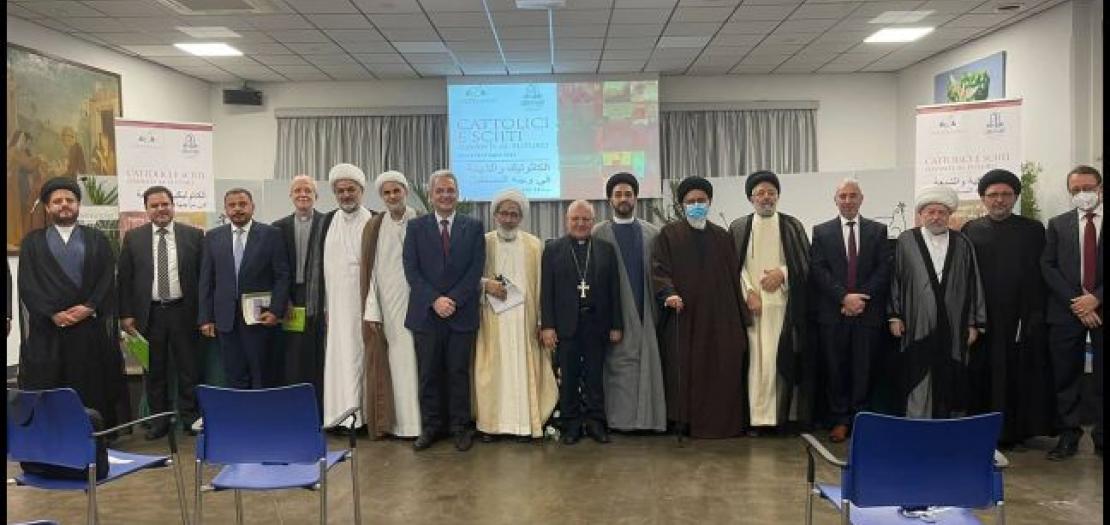The Patriarch of Baghdad of the Chaldeans spoke at a conference organised by the Community of Sant’Egidio titled “Catholics and Shias before the future”. In his address, he mentioned the pope’s visit to Iraq and call for respect for diversity. He urges studying the causes of extremism and finding ways to defeat it. He noted the shared commitment with Grand Ayatollah al-Sistani, and called for an end to the war between Russia and Ukraine.
Rome (AsiaNews) – Cardalin Louis Raphael Sako, Patriarch of Baghdad of the Chaldeans, spoke at a two-day conference titled “Catholics and Shias before the future” held yesterday and today in Rome. The event was organized by the Community of Sant’Egidio.
In his address, the prelate stressed coexistence based on respect for diversity as Pope Francis noted several times during his visit to Iraq. He stressed citizenship as the foundation of social relations and affiliation with the homeland on the basis of equality, not to mention reforming the educational system so that it is better adapted to today’s circumstances, culture and people.
The conference brought together authoritative representatives of both communities, including Jawad Al-Khoei, secretary general of the Imam Al-Khoei Institute, and Mostafa Mohagheegh Damad, theologian and professor of Islamic Law at Shahid Beheshti University in Tehran, Iran. What follows are the main points made by Card Sako:
Today’s society is different from that of the past. The world has changed and it is constantly changing, from tradition to modernity.
The world has become a digital village with social media, not to mention difficult and worrying political conditions. Hence, I propose an appeal to end to the war between Russia and Ukraine and find a diplomatic path to peace.
Our mission and responsibilities as religious leaders are universal, they include everyone and are not limited to a particular faith.
We must counter sectarian ideologies through our words and education, teaching the new generations. The God we believe in does not ask us: Are you a Shiite Muslim or a Sunni? Are you a Catholic or an Orthodox Christian? The only question he asks us is: What did you do for your fellow human being?
God will judge us on our charity.
1. Common living
We must commit ourselves to promoting dialogue and friendship, strengthening closeness and solidarity between different peoples, religions and cultures, to contribute to peace and the well-being of humanity, through close collaboration between the Shiite tradition and the Catholic Church.
We must recognize others and respect them in their diversity. Respect for diversity, as the pope repeated during his visit to Iraq in March 2021, is the basis of coexistence.
When such differences are shared everyone gains. What we call common living existence means sharing bread the basis of nutrition, daily food! Not feeding people causes conflict.
As Antoine de Saint-Exupéry said, the taste of shared bread “has no equal” and sharing in love and purity makes it tastier.
No one must be excluded nor remain indifferent.
This unique situation makes it a place of experimentation, to overcome the shock of divisions and start a courageous and sincere intercultural and interreligious dialogue.
Citizenship and coexistence are a natural right, not a secondary element to be tolerated. The concept of tolerance comes from “tollere”, which means: I allow you to be.
Unfortunately, in recent years, an extremist mindset that incites hatred and violence “in the name of religion” has spread in our and other regions.
This ideology goes against the will of God who “created us different” and represents a threat to the lives of citizens and the security of the state.
We need to study the causes of extremism and violence committed in the name of religion, and find ways to defeat them. In this regard, I would like to thank Grand Ayatollah Ali al-Sistani, the supreme Marjia authority of Najaf, for his position.
2. Citizenship
Citizenship is the foundation of social relations and its principle is affiliation with this homeland. Citizenship means equality, respect for rights, coexistence and harmony among all citizens.
Sectarianism and the concept of “parts” do not help establishing a strong and modern nation state, but rather end up supporting a culture of special interests, which encourages exclusion.
Christians are an indigenous population of Iraq, not a community that comes from another country. They are people of this land, and so it is not acceptable to call them a “minority”.
It is an “injustice” and, at times, Christians are “targeted” for their religious beliefs. The rights of Christians should be as sacred as the rights of others and they cannot be considered second-class citizens because of their faith. Diversity and differences must be a source of richness, a source of energy for creativity, balance and prosperity.
The way forward is the one that leads to a civic and democratic model of citizenship, not a sectarian regime that distributes and shapes the national identity and unity of the country at will. Democracy is an “indivisible whole”.
3. Changing the education system
Iraq’s education system does not help today’s coexistence and culture. We need effective intellectual reform in education, churches, mosques and schools, to adapt to people’s lives, circumstances and culture. Otherwise, our societies will end up heading quickly towards a terrible fate.
To conclude, I will ask the Iraqi government to create a Ministry of Common living to strengthen relations and rights, as well as citizenship. I ask Almighty God to bless us and direct our steps toward a better future for our country and citizens.
By Louis Raphael Sako






